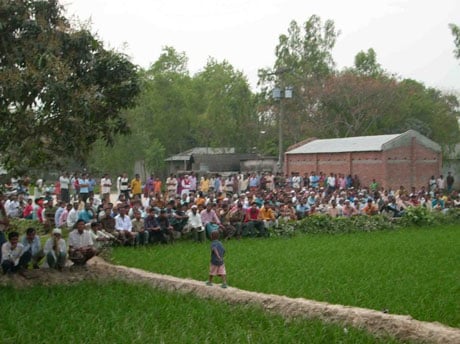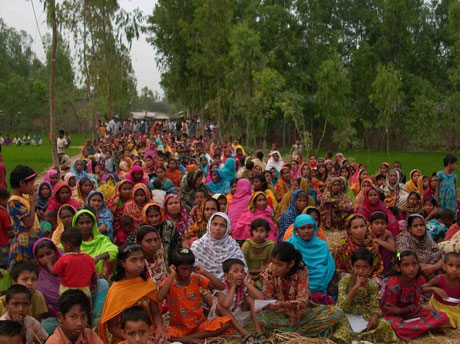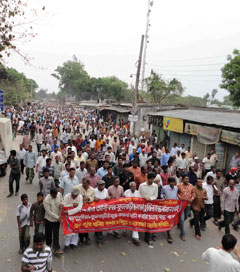Honest, paywall-free news is rare. Please support our boldly independent journalism with a donation of any size.
As the sun rose on March 28, 2011, roughly 2,000 people gathered to demonstrate against a mining project that would displace tens of thousands of people in northwest Bangladesh and establish one of the largest open pit coal mines in the world.
Located in an agricultural region that is home to thousands of farming and indigenous families, the Phulbari Coal Project has been fiercely opposed by Bangladeshi citizens for over six years. Regardless, the UK-based company pursuing the project, Global Coal Management Resources, or GCM (formerly the Asia Energy Corporation), is expressing confidence that the mine will go forward.

In their most recent action to halt the project, protestors enforced a six-hour blockade of Bangladesh's railways and highways that began at 6 AM, reportedly forcing railway authorities to reschedule seven intercity trains and disrupting roads between the northwestern district of Dinajpur and other parts of the country.
In Phulbari, educational and business institutions reportedly remained closed during the blockade.
The demonstrators built on a demand made exactly one month ago: for the government to halt the mine and expel GCM Resources from the country. This time, they said, they will allow 15 days for their demands to be met.

Responding to announcements of the protest, police and members of the Rapid Action Battalion (RAB) were deployed in advance to guard GCM's office, the Phulbari railway station and other key establishments.
RAB, set up as an elite anticrime and antiterrorism force, has become notorious for what several human rights groups describe as the routine use of torture and an alarming number of extrajudicial killings that occur in RAB custody.
Although RAB has been denounced by Human Rights Watch as a “government death squad,” diplomatic cables released by WikiLeaks in 2010 revealed that the UK has provided support to RAB, including training in “investigative interviewing techniques” and “rules of engagement.”
The Phulbari Coal Project is now at a critical juncture. It was stalled in the planning phase when political instability in the country and widespread protests led to the imposition of emergency rule in Bangladesh in 2007. Following national elections in 2008, a new administration began actively reconsidering the mine.
The recent release of another WikiLeaks cable shows that the US has been exerting diplomatic pressure for the project's approval, citing US corporate interests.
Forced Eviction on a Massive Scale
According to GCM's project plans, the Phulbari coal mine would have a lifespan of at least 36 years and extract 16 million tons of coal annually at peak production. Of this, three million tons would be used for domestic energy consumption, with the construction of at least one 500 megawatt coal-fired electricity plant. The remaining coal would be exported.
The project's draft resettlement plan calls for the open pit mine and associated infrastructure to acquire nearly 6,000 hectares of land.
Estimates of the number of people who would be evicted from their homes and lands in order to make way for the immense mega-project vary widely and are disputed.
According to GCM, the project would displace nearly 50,000 people (49,487 people and 11,247 households). However, a 2006 Expert Committee report commissioned by the Bangladeshi government concluded that nearly 130,000 people would be directly affected, and as many as 220,000 people would suffer reduced access to water for drinking and irrigation, with uncertain displacement impacts over time.
GCM's estimate of the number of indigenous people displaced is similarly contested. While GCM says some 2,200 indigenous people would be displaced, independent researchers and Bangladesh's Jatiya Adivasi Parishad (National Indigenous Union) estimate that 50,000 people belonging to 23 different tribal groups would be evicted.
“The project threatens some of Bangladesh's most vulnerable indigenous peoples, who trace their ancestry in the region back 5,000 years,” says Paula Palmer, director of Cultural Survival's Global Response program. Indigenous leaders fear that their ancient cultures and languages would not survive forced displacement and dispersal of their communities. In a overcome hunger in a country in which nearly half of all people currently do not have enough food.
Bangladesh is also one of the world's most densely populated countries. Displaced families would thus require significant support in regaining land and housing, yet project plans state that people displaced for the mine will not receive replacement land – nor will other vital resources, including fish ponds, timber and bamboo trees, be replaced.
“The company is offering displaced families cash, not equivalent land, because no land is available in Bangladesh,” notes Palmer, yet, she says, “studies show that cash payments to such 'development refugees' results in their impoverishment.”
Project impacts on water for household and agricultural use are also expected to be severe. According to the 2006 Expert Committee report, dewatering operations required to keep water from entering mine pits up to 1,000 meters in depth would result in a massive reduction of groundwater throughout a vast region and reduce access to water for 220,000 people.
The prospect of Phulbari's tube wells running dry has raised grave concerns there, where over half of all households report that they do not currently have enough water to meet their needs.
Environmental Risks
The Mangrove Action Project recently launched an international campaign to halt the Phulbari project, citing risks to the Sundarbans Reserved Forest (SRF), a United Nations Education, Scientific and Cultural Organization (UNESCO)-protected mangrove forest and wetlands that contains over half of Bangladesh's remaining natural forest. The vast wetlands include three wildlife refuges – all of which are on UNESCO's World Heritage Site list – and support at least 58 rare and threatened species – including Bangladesh's last remaining population of the royal Bengal tiger.
Despite its protected status, plans for the Phulbari Coal Mine call for coal to be transported through the Sundarbans by a fleet of barges to a floating offshore loading facility, where it will be transferred to oceangoing vessels.
Significantly, the Environmental and Social Impact Assessment (ESIA) for the project commissioned by GCM rates the risk that barge fuel could contaminate the SRF as “extremely high” and “one of the most significant issues associated with the Project.”
In the event of a “worst case scenario” oil spill, the ESIA states, “it is likely there will be damage to the SRF shoreline” and “extreme mortality or severe damage to mangroves and other shoreline plant species.”
There are also serious environmental and health hazards associated with coal mining itself. Although GCM maintains that local residents can continue farming some project lands during and after mining operations, this ignores the risks posed by coal. Mining coal unearths toxic heavy metals, including mercury and acid-forming sulphur, that contaminate soil, water and air, making lands that have been mined less than ideal for agriculture.
Protest and Resistance
The March 2011 demonstration was the latest protest in an ongoing battle to halt the project. Massive public protests involving thousands of citizens began in 2005 and continue through today.
August 26, 2006 is now commemorated as Phulbari Day, an annual day of mourning for those who lost their lives and suffered serious injuries when a government-backed paramilitary group fired indiscriminately on tens of thousands of people protesting the project. Three people were killed, including a 14-year-old child, and more than 200 people were wounded.
This indiscriminate use of violence generated nationwide protests and a four-day general strike, which were brought to an end only when the government signed an agreement calling for the permanent expulsion of Asia Energy from the country and a ban on open-pit mining.
GCM was forced to suspend its operations at that time, and its personnel fled the country under police escort after demonstrators burned down the company's project information office.
Within Bangladesh, national opposition to the project has been led by the National Committee to Protect Oil, Gas, Mineral Resources and Ports, whose local leader, Mr. Nuruzuman, was reportedly tortured by the Bangladesh military in 2008 for his activities.
“Despite violence and intimidation aimed at silencing opponents, some 100,000 people participated in the final rally, ending an incredible one-week, 250-mile Long March from Dhaka, Bangladesh's capital, to Phulbari last October, notes Joanna Levitt, executive director of the International Accountability Project, a human rights organization working to halt the mining project.
On February 28, 2011, roughly 2,000 protestors gathered for the rally and highway blockade in Phulbari, stranding some 500 passenger buses and vehicles on both sides of the highway.
Opponents' key demands remain unchanged: the government must fulfill the agreement signed on August 31, 2006, which bans open-pit coal mining and calls for GCM to be permanently expelled from the country.
GCM Resources
Despite sustained opposition, GCM remains confident that it will be able to move the project forward. The government of Bangladesh plans to announce a new coal policy by June 2011, and GCM expects that the new policy will clear the way for them to secure the “green light” that their investors are impatiently calling for.
In January of 2011, Cultural Survival sent a letter to GCM Chief Executive Steve Bywater calling for an immediate halt to planning for the mine, saying that it would forcibly remove thousands of indigenous people from their homes and farmlands, in violation of the UN Declaration on the Rights of Indigenous Peoples (UNDRIP).
In a reply dated March 8, 2011, Bywater disputed this claim, saying that, “Our resettlement programme will recognize the right of all affected people to free, prior and informed consent.” However, Bywater's reply does not address the fact that no one in Phulbari is being offered the option of saying no to eviction and resettlement.
Bywater also notes that the project will bring the country needed electricity, and “roughly a third of the revenues generated by the Project will go to the Government in the form of royalties, corporate taxes, customs and duties, and taxes paid by employees, suppliers and contractors.”
GCM's claims regarding financial benefits to Bangladesh are strongly contested by project opponents, who argue that the nation will lose, not profit, if GCM is permitted to extract the country's nonrenewable resources while paying only six percent in royalties and profits.
Taking Bywater's figures at face value, two-thirds of project revenues will go outside of Bangladesh – and, a recently released WikiLeaks documents suggests, toward wealthy investors in the Global North.
WikiLeaks Reveals Evidence of US Interference
In December 2010, WikiLeaks released a diplomatic cable that revealed that the US ambassador to Bangladesh, James Moriarty, has actively intervened to push the Phulbari Coal Project forward.
In the July 2009 cable, Moriarty cites 60 percent US investment in GCM and urges Tawfiq Elahi Chowdhury, the energy advisor to Bangladesh's prime minister, to authorize open-pit mining as “the best way forward.”
Moriarty also notes that Chowdhury admitted that the coal mine was “politically sensitive in the light of the impoverished, historically oppressed tribal community residing on the land,” but that Chowdhury agreed to build support for the project through the parliamentary process.
“WikiLeaks cables prove that US officials chose to ignore the tens of thousands of Bangladeshi people marching in the streets to oppose this mine. Behind closed doors, they aggressively pushed for a reckless coal project that would evict and impoverish thousands in Bangladesh – and line the pockets of a few hedge fund managers in the US,” commented Levitt.
According to the international organization BankTrack, major shareholders in GCM Resources are Aurora Investment Trust PLC, Christian Leone, Credit Suisse First Boston Equities Ltd, LCG Holdings LLC, Luxor Capital Group and Polo Resources Ltd.
LCG and Luxor Capital Group are owned by Christian Leone, a US citizen and former Goldman Sachs employee who also operates a New York-based hedge fund in his own name.
Energy at What Price?
Over 100 civil society organizations from 31 countries have endorsed a letter to the Phulbari project's worldwide financial backers, detailing human rights abuses and environmental concerns associated with the project and calling on private banks to withdraw their support.
Their concerns include the potential for further violence against project opponents. The Expert Committee commissioned by Bangladesh's government shares these concerns, warning of “a high risk of social unrest and conflict” if GCM attempts to forcibly relocate tens of thousands of people, most of whom have land-based livelihoods.
Despite these warnings and sustained protests against the project, GCM continues to maintain that the project would be good for the people of Bangladesh and would bring needed electricity.
Coal, however, is not the only energy option. An alternative development model can be seen in the Indian state of Orissa, which recently installed decentralized solar power to provide energy to 2,000 villages without large-scale displacement of people or destruction of their lands and communities
Many within Phulbari regard the GCM's coal mine project as a violation of their rights. As one community member interviewed by the International Accountability Project said: “This movement is for human rights. This is against the aggression of the multinational companies. So, the international community should come forward to save the human rights, to save the community.”
A terrifying moment. We appeal for your support.
In the last weeks, we have witnessed an authoritarian assault on communities in Minnesota and across the nation.
The need for truthful, grassroots reporting is urgent at this cataclysmic historical moment. Yet, Trump-aligned billionaires and other allies have taken over many legacy media outlets — the culmination of a decades-long campaign to place control of the narrative into the hands of the political right.
We refuse to let Trump’s blatant propaganda machine go unchecked. Untethered to corporate ownership or advertisers, Truthout remains fearless in our reporting and our determination to use journalism as a tool for justice.
But we need your help just to fund our basic expenses. Over 80 percent of Truthout’s funding comes from small individual donations from our community of readers, and over a third of our total budget is supported by recurring monthly donors.
Truthout has launched a fundraiser, and we have a goal to add 182 new monthly donors in the next 24 hours. Whether you can make a small monthly donation or a larger one-time gift, Truthout only works with your support.
